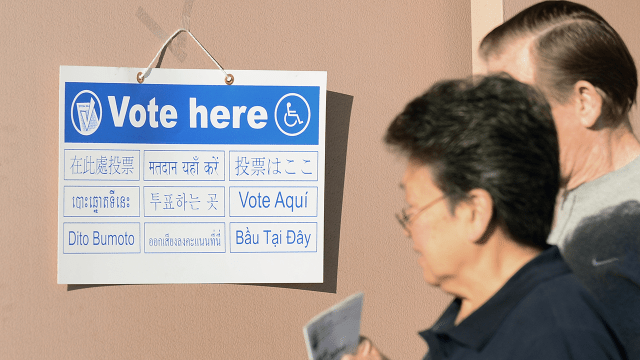
Nearly all Asian American registered voters (97%) say a candidate’s policy positions are more important than their race or ethnicity when deciding whom to vote for. This sentiment is widespread among all major demographic subgroups of Asian registered voters.
Pew Research Center conducted this analysis to understand Asian American registered voters’ priorities for political candidates and issues facing their communities. In this analysis, “registered voters” and “voters” are used interchangeably to refer to those who self-report being certain they are registered to vote at their current address.
The analysis of Asian American registered voters is based on a nationally representative survey of 7,006 Asian adults. The survey sampled U.S. adults who self-identify as Asian, either alone or in combination with other races or Hispanic ethnicity. It was offered in six languages: Chinese (Simplified and Traditional), English, Hindi, Korean, Tagalog and Vietnamese. All responses were collected from July 5, 2022, to Jan. 27, 2023, by Westat on behalf of Pew Research Center. All findings – including for the most important issue facing the communities Asian adults live in – were captured during this long field period.
The Center recruited large enough samples of the Chinese, Filipino, Indian, Japanese, Korean and Vietnamese registered voter populations to report findings for each group separately. These are the six largest origin groups among Asian Americans. These groups include those who identify with one Asian ethnicity only, either alone or in combination with a non-Asian race or ethnicity. For more details, read the methodology. For questions used in this analysis, read the topline questionnaire.
Pew Research Center is a subsidiary of The Pew Charitable Trusts, its primary funder. The Center’s Asian American portfolio was funded by The Pew Charitable Trusts, with generous support from The Asian American Foundation; Chan Zuckerberg Initiative DAF, an advised fund of the Silicon Valley Community Foundation; the Robert Wood Johnson Foundation; the Henry Luce Foundation; the Doris Duke Foundation; The Wallace H. Coulter Foundation; The Dirk and Charlene Kabcenell Foundation; The Long Family Foundation; Lu-Hebert Fund; Gee Family Foundation; Joseph Cotchett; the Julian Abdey and Sabrina Moyle Charitable Fund; and Nanci Nishimura.
We would also like to thank the Leaders Forum for its thoughtful leadership and valuable assistance in helping make this survey possible.
The strategic communications campaign used to promote the research was made possible with generous support from the Doris Duke Foundation.
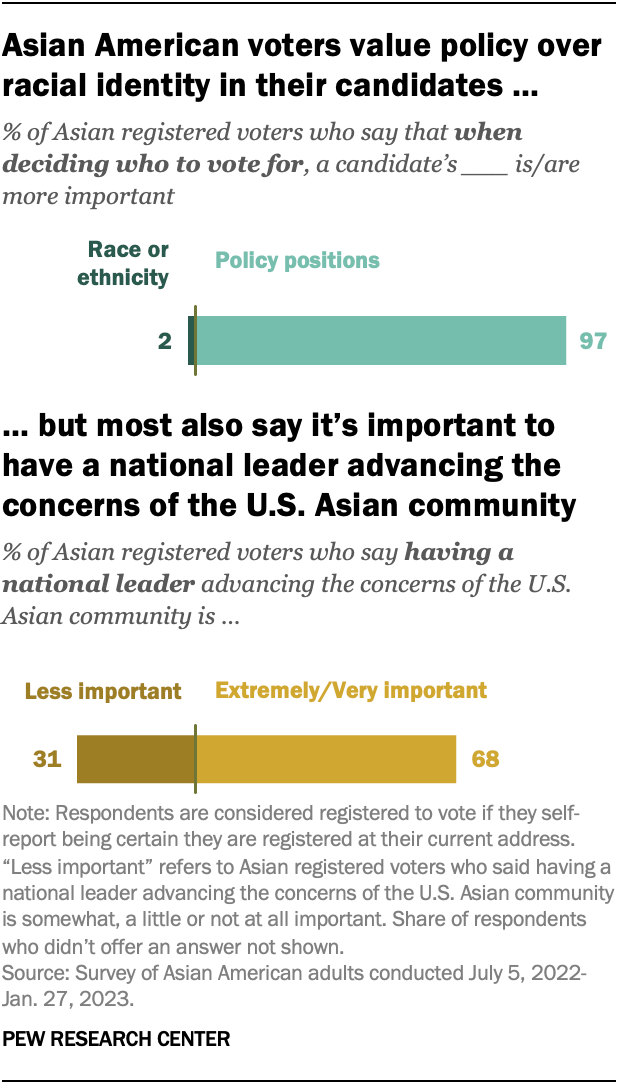
At the same time, a 68% majority of Asian registered voters say it’s extremely or very important to have a national leader who can advance the concerns of the U.S. Asian community, according to a nationally representative Pew Research Center survey conducted from July 2022 to January 2023.
These findings are especially relevant as the 2024 U.S. presidential election approaches. Two candidates of South Asian ancestry, Nikki Haley and Vivek Ramaswamy, are running for the Republican nomination.
Asian Americans continue to be underrepresented among elected officials in the United States compared with their share of the country’s population. As of the beginning of the 118th Congress, 16 House members and two senators claim Asian ancestry.
Asian registered voters tend to prefer the Democratic Party: 62% are Democrats or lean Democratic, while 34% are Republicans or GOP leaners. Most Asian origin groups are majority Democratic. However, more Vietnamese registered voters identify as Republican than Democratic (51% vs. 42%).
What issues do Asian American voters care about the most?
About four-in-ten Asian American registered voters (41%) say inflation is the most important issue facing their local community – by far the most common issue cited during this extended survey period, which ended in January.
Economic inequality (16%) is the second-most mentioned issue, followed by violent crime (11%) and racism (9%). These concerns follow reports of violence against Asian Americans during the COVID-19 pandemic.
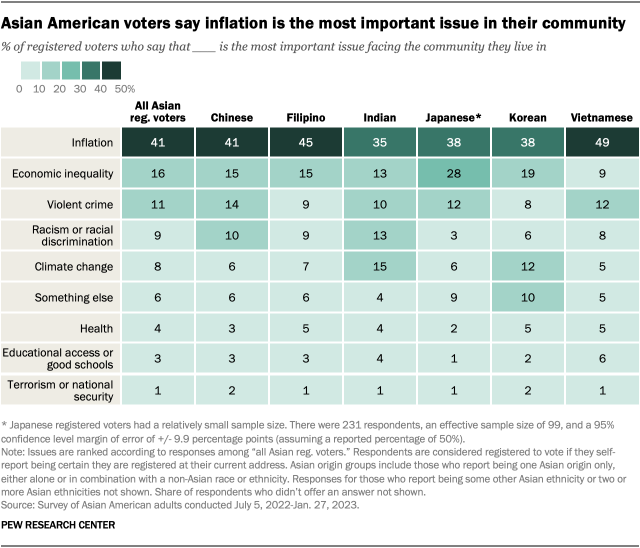
Among the six largest Asian origin groups, inflation is consistently cited as the biggest issue facing Asian American voters’ communities. In addition, the ranking of issues is largely similar across origin groups, though some minor differences emerge:
- Japanese registered voters (28%) are more likely than Chinese (15%), Filipino (15%), Indian (13%) and Vietnamese (9%) voters to view economic inequality as the biggest issue facing their community.
- 15% of Indian registered voters say climate change is the most important issue facing their community. This is higher than the share saying the same among Filipino (7%), Chinese (6%), Japanese (6%) and Vietnamese (5%) voters.
How do Asian American voters’ views differ by political party?
Views of top issues diverge sharply by party among Asian American registered voters:
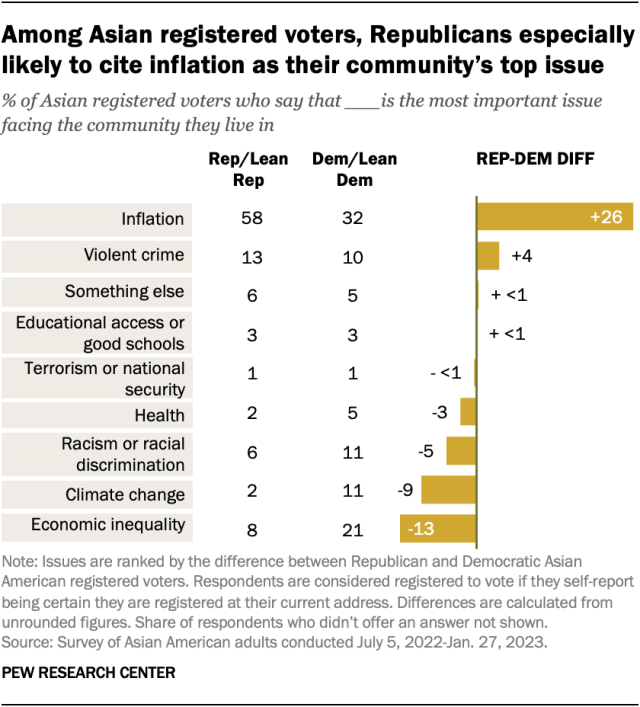
- Asian Republican voters are more likely than their Democratic counterparts to view inflation as the most important issue facing the community they live in. Even so, it is the most cited top issue for both groups.
- Asian Democratic voters are more than twice as likely as Republicans to say economic inequality is the biggest issue facing their community.
- Economic inequality is the second-most cited issue among Asian Democratic voters. Among Asian Republican voters, violent crime is the second-most cited issue.
How do Asian American voters’ views differ by nativity?
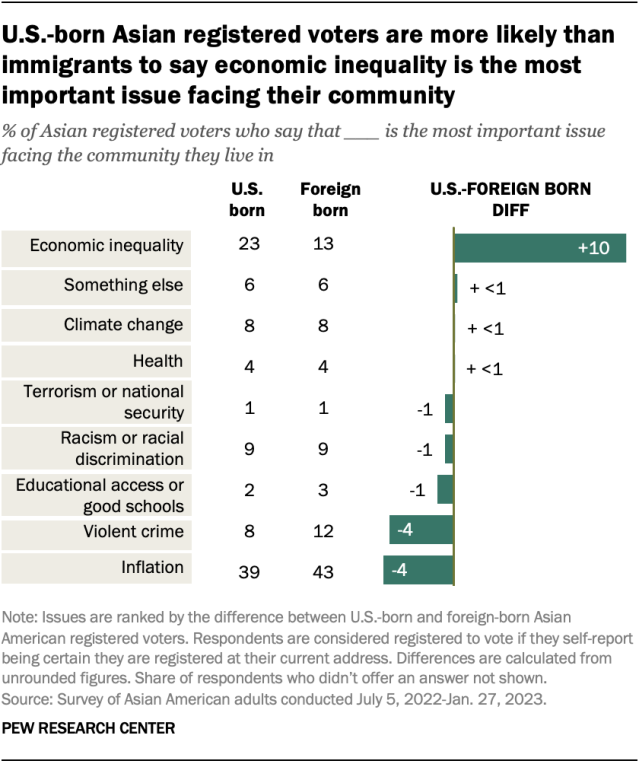
Views of top issues also vary somewhat by nativity among Asian American registered voters – that is, based on whether they were born in the U.S. or abroad.
Asian registered voters born in the U.S. are slightly more likely than immigrants to view economic inequality as the most important issue facing their community. However, importance of issues varies less by nativity than by party among Asian Americans.
Note: Here are the questions used for this analysis, along with responses, and the survey methodology.